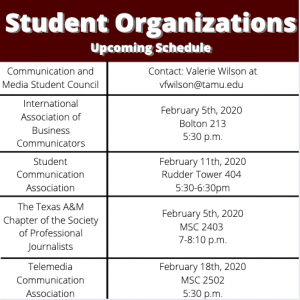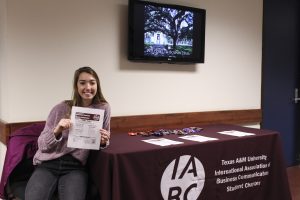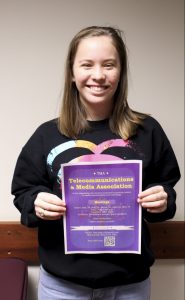Finding a Fit in the Department of Communication
The Department of Communication has fostered multiple student-run organizations where undergrad students can develop professional skills while interacting with like-minded classmates. There is a large boost to professional development for a small time commitment each month. Each organization has its own focus that helps narrow down the COMM degree into a specific field of interest.
By M’kenna Norman
Because finding a niche within a university of nearly 60,000 undergraduate students can be overwhelming, the Department of Communication has fostered multiple student-run organizations where undergrads can make friends while building professional skills.
 The five COMM student organizations open networking opportunities and provide skill-building workshops to help each student prepare for a post-graduation career.
The five COMM student organizations open networking opportunities and provide skill-building workshops to help each student prepare for a post-graduation career.
“The benefits of joining one of these student organizations is to meet like-minded classmates, gain a better understanding of jobs in Communication, and network with professionals in the field,” said Nancy Parish, chair of the Council of Student Associations.
The goal is to offer a big boost to a student’s professional development without adding a big time commitment to their schedule, Parish said. It’s also a great opportunity to meet people in the job market and to get professional advice about resumes and job skills, she added.
“Each organization has their own focus,” Parish noted. “Students are trying to find out what they can do with their degree, and joining an organization helps narrow your major to a field you’re interested in.”
International Association of Business Communicators
Faculty Advisor Nancy Parish, nparish@tamu.edu
The purpose of IABC is to connect students with professionals in the communication industry, and to teach good business practices, said Andi Minter, vice president of IABC student chapter. Monthly guest speakers often offer direct contact information as a resource, she said.
Faculty advisor Nancy Parish explained IABC’s focus on public relations.
“We look through a PR business communication lens and focus on social media, branding and marketing,” said Parish. Members get advice from PR professionals and have access to online workshops to develop public relation skills, she said.
Becoming part of the IABC Student Chapter is simple, said Minter.
“Just show up to any meeting to join,” said Minter. She noted there is a $10 chapter fee and the $49 national dues fee to be a member.
“It is a great resume builder, and we have a lot of fun through social events, study sessions and profit shares,” Minter said.
Student Communication Association
Faculty Advisor Kylene Wesner, kylene@tamu.edu
SCA helps students searching for a career path within the Communication field by connecting specific jobs to working professionals.

Vice President Andi Minter tabled at Bolton to raise awareness about the IABC organization.
“We want to help COMM students narrow what they want to do since they are in such a broad major,” said Mason Terry, SCA president. “But everyone uses communication, so we’re open to all majors.”
The opportunity to interact with people of similar interests – and to put names and faces to real communication jobs – is huge, said Kylene Wesner, SCA faculty advisor. Students also learn about what they can do with their COMM degree after graduation, added Wesner.
While the time commitment of SCA is small, the benefits can be huge, said Abbey Holland, SCA vice president.
“We meet once a month, and for as little commitment as the meetings are, it can make such a big impact on your future,” said Holland. “The fee is $40 for the year, and it’s worth it for the networking and internship opportunities.”
The Texas A&M Chapter of the Society of Professional Journalists
Faculty Advisor Dale Rice, dalerice@tamu.edu
The Student Chapter of SPJ is an organization for those who aspire to work as a journalist or in a related field, said faculty advisor Dale Rice. It also offers great opportunities to explore different aspects of the profession, he added.
The group welcomes student members from a variety of majors.
“Journalism skills are applicable to every job, so it’s not an org just for journalists,” explained Jackson King, president of the Texas A&M Chapter of SPJ.
“We ultimately have two goals,” said King. “Connect people with journalists in the outside world and help them build their journalistic skills.”
“The club is really fun without there being a huge requirement,” King added.
SPJ meetings are every other week and are free to attend, King said. Frequent members will need to apply for a membership to the national SPJ organization, which is $35 annually for students, King said.
Telecommunication Media Association
Faculty Advisor Randall S. Sumpter, r-sumpter@tamu.edu
The goal of TMA is to educate members about potential career paths for TCMS majors while holding job preparation workshops, said Jenna Russell, TMA president.
“We meet once a month, every third Tuesday,” said Russell. “For just $10 a semester, anyone who has a passion in media, communication or technologies can join.”

Jenna Russell, TMA President, handed out information about TMA in Bolton Hall.
The group is in a rebuilding phase, making this a great time for students to get involved, explained TMA faculty advisor Randall S. Sumpter. Right now, the focus is on connecting students with professionals in their area of interest, and giving them space to network with like-minded students, said Sumpter.
It all comes down to preparing students for the next step after graduation, said Russell.
“We hope to continue to grow with the close input of our members, while bringing in speakers talking about TCMS careers,” said Russell, “and what you can do to prepare for them.”
Communication and Media Student Council
Faculty Advisor Kristy Kulhanek-Stockmoe, kristy@tamu.edu
In Spring 2019, COMM faculty and staff members selected a group of students to serve on the CMSC as representatives to other COMM students in the department, said Brandi Gomez, who is serving as the Council’s first president.
While CMSC does not have an open membership, Gomez explained that each council representative is a connecting point for students in the different COMM majors and minors. This gives students a way to provide input directly to COMM department leadership and faculty.
“We are the voice of the students,” said Gomez. “They come with a complaint or idea, and our purpose is then to enact change based on their input.”
The goal is for students to feel comfortable with – and confident in – student council members, said Gomez. Council representatives typically coordinate with faculty to make classroom announcements about CMSC during the semester so students know who to talk to about concerns or suggestions.
“We encourage people to talk to us, and our hope is to make the COMM department more inclusive,” said Gomez. “We have so many professional opportunities within the department, but we really want diversity and inclusion to speak for the students.”
Lambda Pi Eta
Faculty Advisor Stacy Aschenbeck, stacy-h-aschenbeck@tamu.ed
“We are a nationally recognized honors society that exists at universities across the country,”
said Madelyn MacArthur, president. “We hold a certain consistent standard of academic
excellence in the degree.”
There is an 80% overlap in membership between LPE and the Honors Program so there
are a lot of mixed socials, events and study times, said MacArthur. There aren’t any
organizational meetings, just socials announced through GroupMe and email, she added.
“We don’t want it to be a huge time commitment, but it gives opportunity to connect with
other students and get to know the honors faculty,” said MacArthur. “The name itself is
distinguished, and it’s a refined way to say you have worked hard and we recognize
that.”
Students who are eligible to join, based on GPA performance, will receive an email giving them
all the necessary information, said MacArthur.
- Dept News
- Events
- In the Department
- Andi Minter
- Brandi Gomez
- Business Communicators
- CMSC
- Communication
- Communication and Media Student Council
- Dale Rice
- Faculty Advisor
- IABC
- International Association of Business Communicators
- Jackson King
- Jenna Russell
- Kristy Kulhanek-Stockmoe
- Kylene Wesner
- Lambda Pi Eta
- Madelyn MacArthur
- Nancy Parish
- Randall S. Sumpter
- Randall Sumpter
- Society of Professional Journalists
- SPJ
- Stacy Aschenbeck
- Student Communication Association
- Student Organizations
- StudentOrganizations
- TAMU
- TCMS
- Telecommunication Media Association
- Texas A&M Student Organization
